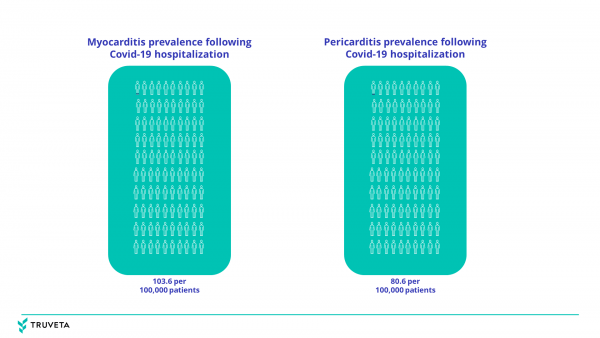Rates of myocarditis, pericarditis, and other cardiac conditions have been reported both during the acute phase of Covid-19 infection and up to 12-months post infection. Since this is American Heart Month, we wanted to learn more.
So, we asked two key questions of a sample of our data of Covid-19 hospitalized patients: 1) What is the prevalence of cardiac inflammatory conditions (myocarditis and pericarditis) for individuals admitted to the hospital with Covid-19? 2) Is there a demographic group that had a higher observed prevalence of post-infection cardiac inflammatory conditions than other groups?
The takeaway? We found while rates of myocarditis and pericarditis are rare following hospitalization for Covid-19 (~0.1% for both), males aged 18-44 had over twice the occurrence of myocarditis and pericarditis relative to the overall population.
Methods
We included a sample of the Truveta Platform data with patients who had an encounter associated with both a positive Covid-19 diagnosis and a hospital stay. We excluded patients with a myocarditis or pericarditis diagnosis at any point prior to the first encounter date associated with the in-patient stay and positive Covid-19 diagnosis. We then identified those patients who had experienced pericarditis or myocarditis on or any time after the date of their Covid-19 diagnosis.
Results
Overall, we calculated the prevalence of myocarditis and pericarditis to be 103.6 and 80.6 per 100,000 people, respectively, for our in-patient population.

We also wanted to know if there was a demographic group that experienced a higher prevalence of myocarditis and/or pericarditis compared to other groups. After stratifying our data by sex and age (0-4, 5-11, 12-17, 18-44, 45-64, and 65+ years of age) we found that males aged 18-44 had over twice the occurrence of myocarditis and pericarditis, at 246.4 and 221.7 per 100,000 respectively.
Conclusion
Our results show the aggregate of both acute and long-term risk of myocarditis and pericarditis following Covid-19 infection for those who have been hospitalized. Our findings also highlight the need for additional long-term follow-up of people infected with Covid-19 and further investigation into the subgroups most at risk for developing cardiovascular-related complications from Covid-19.
These are preliminary research findings and not peer reviewed. Data are constantly changing and updating. These findings are consistent with data from 2/24/22.
